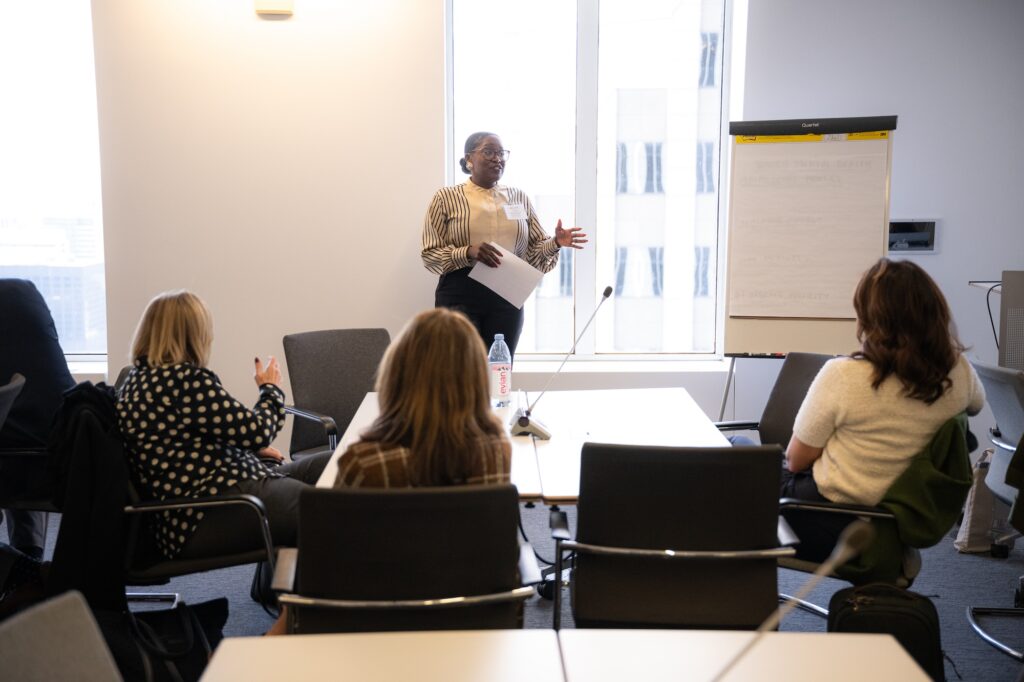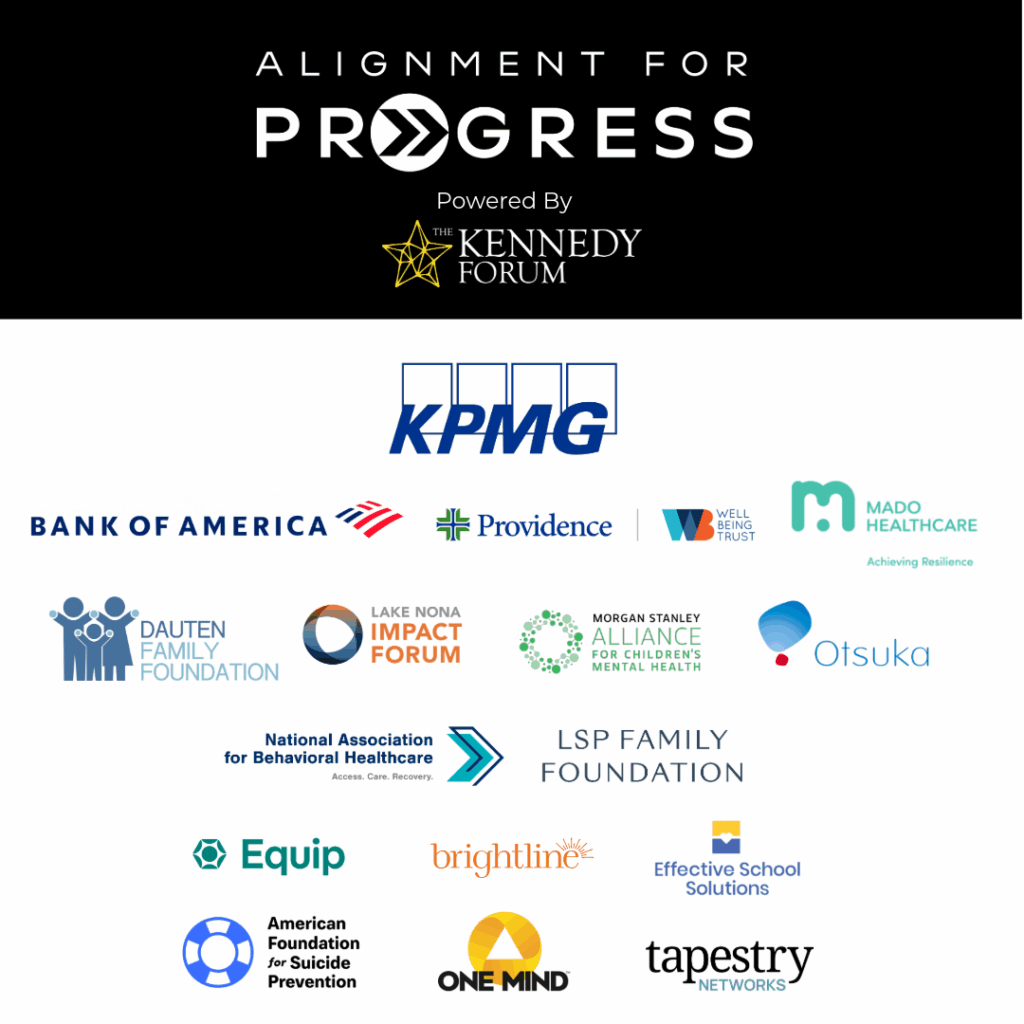The Alignment for Progress Series explores the pressing issues on the minds of decision-makers.
Last month, leaders from across the country gathered at KPMG in Chicago for The Alignment for Progress Kickoff Workshop, powered by The Kennedy Forum. Dozens of changemakers — from business and health care to government and philanthropy — came together to confront some of the most urgent challenges in mental health. Through dynamic panels and breakout sessions, participants tackled big questions about the future of the field. Here’s what they discovered — and where we go from here.

1. We Have to “Override the Amygdala Response”
The Kennedy Forum founder opened the Alignment for Progress Workshop in conversation with Co-Founder Patrick J. Kennedy about what it means to lead during disruption. In a time of polarization and uncertainty, he emphasized the importance of consciously overriding the “amygdala response” — the instinctive fear and reactivity that can block progress — and instead leading with strategy and purpose.
Mental health holds a unique position — it unites people across political and social divides and fuels competitiveness in the emerging brain health economy. By staying focused on long-term goals and evidence-based alignment, we can transform disruption into opportunity, advancing both national resilience and human potential.
The 90-90-90 by 2033 vision offers a unified vision: ensuring 90% of people are screened, 90% receive treatment, and 90% achieve recovery.

2. AI Will Re-Test the Mental Health Ecosystem’s Ability to Adapt
The mental health field has seen what happens when technology passes us by. When the U.S. invested in electronic health records through the 2009 HITECH Act, mental health and substance use providers were left out. That exclusion still limits our ability to deliver integrated, data-driven care — a missed opportunity that continues to ripple across the system.
As artificial intelligence reshapes health care, we can’t afford to stay on the sidelines. As panelist Vaile Wright pointed out “AI is just a tool — it’s not inherently good or bad, it’s how we use the tool.” This time, mental health leaders must be at the table, shaping how AI supports care, safeguards equity, and strengthens connection.
Wright said it best: “AI is built by humans, for humans.” If those who understand human behavior guide its development, applications, and delivery, we can turn uncertainty into progress — ensuring technology amplifies empathy, expands access, and finally unites mental health with the rest of health care.

3. Much Like STEM in the 2000s, Mental Health Is the New Innovation Imperative
We’ve reached a watershed moment in workplace mental health. Despite record investment in wellness and well-being programs, mental health conditions continue to rise while life satisfaction hits new lows.
This is more than a workforce issue — it’s an economic one. Brain health conditions cost the global economy $5 trillion annually, a figure expected to triple by 2030. During the workshop, economists, health care leaders, and business executives explored other examples of successful innovation movements. They noted the early 2000s STEM movement as a model, when the private sector invested heavily in education pipelines, training programs, and incentives that expanded and diversified the workforce.
The challenge for mental health advocates is similar: to position brain health as a global imperative and an engine for competitiveness. In the emerging “brain era,” success depends on agile, resilient, analytical minds. Investing in mental health isn’t just good policy — it’s an investment in national strength.

4. Value-Based Care Is Only Achieved Through Radical Collaboration and Transparency
For participants exploring value-based care, one message was clear: the mental health system is still speaking too many different languages. Across hospitals, payers, and community providers, there’s no shared definition of success — is it recovery, reduced hospitalizations, or improved access? Without alignment, data remains siloed, and what truly matters — people getting better — gets lost.
Meanwhile, technology has outpaced policy and trust, leaving data locked behind privacy fears and incompatible platforms. The system is ready for transformation but trapped by fragmentation.
The path forward demands radical collaboration and transparency. Tools like the Mental Health Parity Index can help expose inequities and create a shared baseline for progress. To drive U.S. competitiveness in the brain health era, we must move from fragmentation to alignment—sharing data responsibly and defining success together.

5. Mental Health Can’t Fit a Slogan, But It Can Fall Under a Framework
We’ve entered a new era of mental health — one that looks very different from the years immediately following the pandemic. Awareness has never been higher, and mental health is now part of mainstream conversation. But with that progress comes a new challenge: our messaging must evolve from crisis response to sustained action.
Participants agreed that effective communication today requires both clarity and depth. We can’t oversimplify an issue that spans serious illness, substance use, and everyday brain health — but we also can’t lose audiences in nuance. The key is balancing data and emotion, pairing sobering statistics with stories of resilience, productivity, and hope.
The most powerful messages answer three questions: Why it matters now, what’s possible when we act, and how leaders can make progress real. Mental health may never fit neatly into a slogan, but it can unite under a shared framework for lasting change.

6. Youth Mental Health Progress Depends on Fixing Systems—and Fostering Connection
As The Kennedy Forum works to define the upstream causes of youth mental health challenges, our session with education leaders revealed an important truth: the crisis is both systemic and deeply human.
Institutional gaps in access and support collide with personal struggles for connection, belonging, and resilience. Addressing both requires innovation at every level: care models that extend into schools and communities, preventive solutions that strengthen family and peer networks, and shared measures that track engagement, outcomes, and recovery. By aligning these approaches, The Kennedy Forum and its partners are turning insight into impact — ensuring every young person has the opportunity to thrive.
Stay Connected to the Movement
The Alignment for Progress Workshop is just the beginning. Follow The Kennedy Forum on LinkedIn for the latest updates, insights, and opportunities to collaborate. You can also sign up for our email updates to stay informed about the next steps in advancing mental health equity and driving progress in the brain health economy.
Thank you to Our Generous Sponsors!


